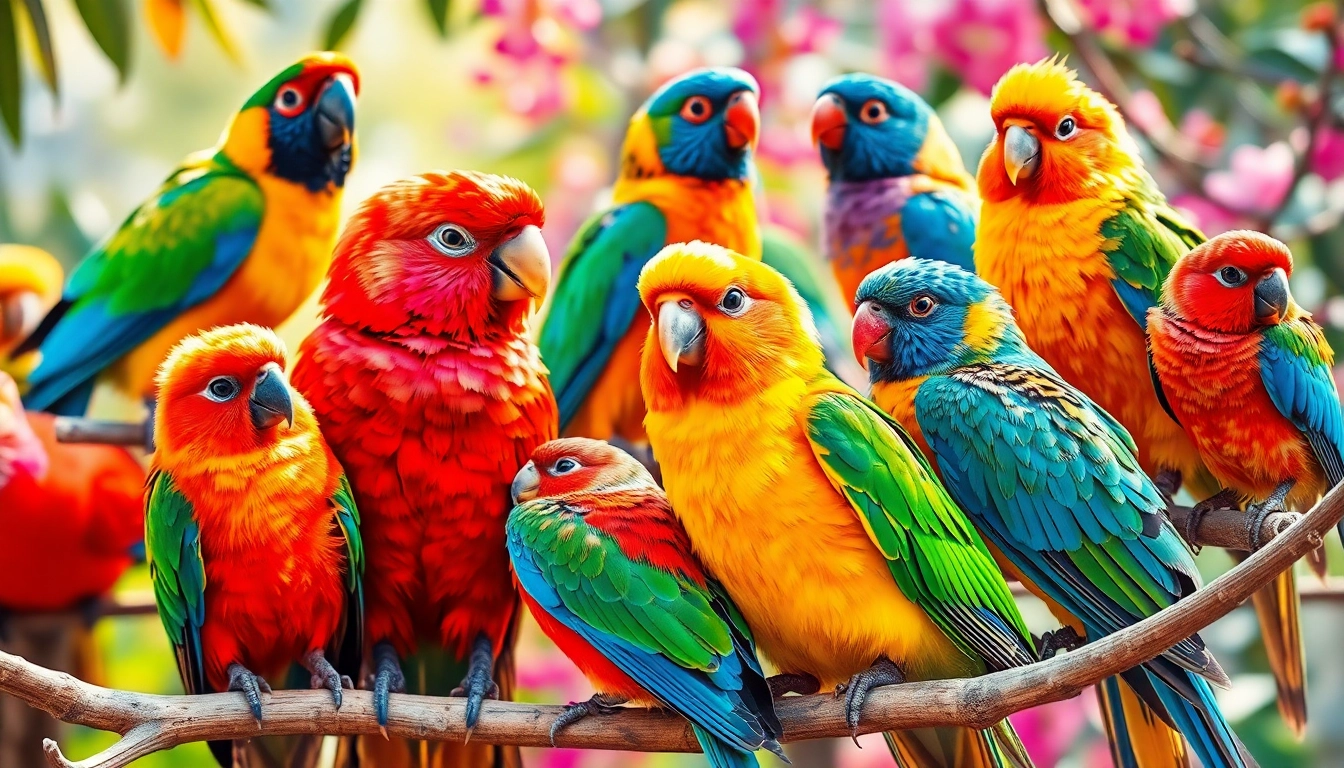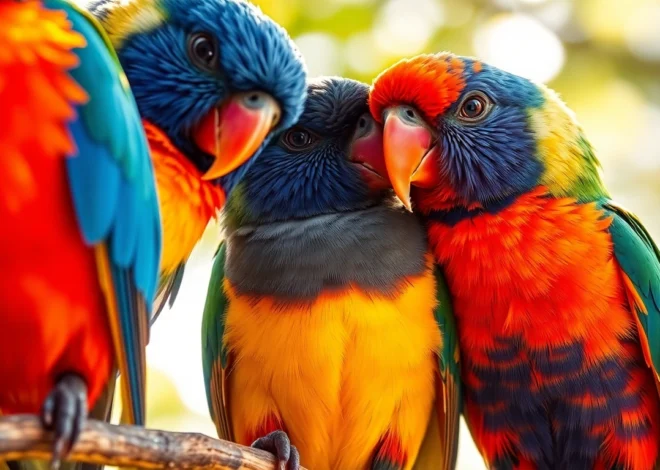
Comprehensive Guide to Pet Birds: Types, Care, and Choosing the Perfect Companion
Understanding Different Types of Pet Birds
Embarking on the journey of pet bird ownership requires a comprehensive understanding of various bird species, their personalities, care needs, and suitability for different lifestyles. With thousands of bird species worldwide, selecting the right pet bird involves considering factors like size, lifespan, personality traits, and your capacity for care. This guide aims to provide an in-depth look into popular bird species, their characteristics, and practical advice to ensure a rewarding and responsible pet ownership experience.
Popular Beginner-Friendly Species
For those new to bird ownership, choosing a species that is manageable, sociable, and forgiving of beginner mistakes can make all the difference. Among the most recommended beginner-friendly pet birds are parakeets (also known as budgerigars), cockatiels, and lovebirds. These species tend to adapt well to captivity, require relatively simple care routines, and display engaging personalities.
Parakeets (Budgerigars or Budgies)
Parakeets are small, colorful, and highly intelligent birds that are popular among first-time bird owners. Native to Australia, they are known for their playful nature and ability to mimic sounds to some extent. Budgies typically live around 10-15 years, with proper care. Their size, ease of handling, and affordable cost make them an ideal starting point for learning about pet bird care. They thrive with mental stimulation and social interaction, so providing toys, interaction, and a stimulating environment is essential for their wellbeing.
Cockatiels
Cockatiels are slightly larger than parakeets and are renowned for their affectionate nature and inquisitiveness. They are often described as social, friendly, and playful. Cockatiels can live up to 20 years with proper care and are known for their distinctive crests and whistling abilities. They are quite adaptable and can thrive in various home environments, making them suitable for beginners who want a pet that responds well to human interaction.
Lovebirds
Lovebirds are small parrots that are highly social and thrive on companionship. They are lively, intelligent, and bond closely with their owners. Due to their social nature, they often do best when kept in pairs, although individual lovebirds can also be happy with regular socialization. With a lifespan of about 10-15 years, lovebirds require daily interaction, mental stimulation, and a stimulating environment to prevent boredom and behavioral issues.
These species exemplify the balance between manageable care and engaging personalities, making them excellent choices for newcomers to avian companionship.
Large Parrots vs. Small Finches: Pros and Cons
Deciding between larger parrots and smaller finches often hinges on your living environment, time commitment, and personal preferences. Understanding the advantages and challenges of each can help you make an educated decision tailored to your lifestyle.
Large Parrots
- Examples: Hyacinth Macaws, Amazons, African Greys, Cockatoos
- Pros: Highly intelligent, capable of developing vocabulary and complex behaviors; longer lifespan (sometimes over 50 years); strong bond with owners.
- Cons: Require a significant time investment for socialization and training; often need larger cages and more space; can be noisy; higher initial and ongoing care costs; potential behavioral issues if neglected.
Small Finches
- Examples: Zebra finches, Society finches
- Pros: Easy to care for, inexpensive, compact, and less demanding on space; great for observing natural behaviors like singing and flocking; short lifespan allows quick experience with bird care.
- Cons: Less interactive and trainable; social birds that often require company of their own kind; limited interaction with humans; shorter lifespan (around 5-10 years).
Choosing between these options depends on your ability to dedicate time, space, and resources. Large parrots bring incredible companionship and intelligence but demand more attention and space. Conversely, finches are ideal for enthusiasts seeking a manageable, social, and budget-friendly pet that offers fascinating natural behaviors.
Distinct Personality Traits and Care Needs
Understanding the personalities and specific care requirements of different bird species is crucial for fostering a happy and healthy pet. While personality can vary within species, general traits and needs can guide your selection and daily routines.
Personality Traits
- Budgerigars: Curious, playful, and social. They enjoy interaction, toys, and singing. Some can mimic words and sounds.
- Cockatiels: Affectionate, inquisitive, and quite social. They often enjoy whistling and stepping onto fingers.
- Lovebirds: Energetic, affectionate, and sometimes a bit loud. They thrive on companionship and can be quite mischievous.
- Hyacinth Macaws: Gentle giants with calm disposals but require more space and mental stimulation due to their intelligence.
- Finches: Active, social, and bright singers. They prefer flock settings and minimal handling.
Care Needs
- Diet: All pet birds require a balanced diet tailored to their species, including high-quality pellets, fresh vegetables, fruits, and occasional seeds. Hydration and vitamin supplementation are also essential.
- Habitat: Proper cage size, bar spacing, perches, toys, and safety features are critical. Enclosures should mimic natural environments and provide mental stimulation.
- Socialization: Many birds are social creatures that thrive on interaction. Daily social time enhances their mental health and reduces behavioral issues.
- Health Management: Regular veterinary checkups, cleanliness, and attention to signs of illness maintain longevity and quality of life.
Each species’ personality and care requirements reflect their natural behaviors and evolutionary history. Tailoring your environment and interactions accordingly will elevate your pet bird’s quality of life and foster a rewarding bond.
Key Considerations for Caring for Pet Birds
Basic Habitat Setup and Safety Tips
Creating a safe, stimulating environment is foundational to healthy pet bird care. Your habitat should meet size, safety, and enrichment needs specific to your bird’s species.
- Cage Size: Ensure sufficient space for flight or movement—at least 2x the wingspan in each dimension for small birds, larger for bigger species.
- Bar Spacing: Bars should be narrow enough to prevent escape or injury, typically less than the bird’s head width.
- Perches and Toys: Use varied perches to promote foot health and include stimulating toys to prevent boredom.
- Safety: Remove toxic plants, non-food safe paints, and choking hazards. Cover or secure windows and ceiling fans to prevent accidents.
Maintaining a clean environment, monitoring for hazards, and periodically inspecting cage components are critical safety practices that support your bird’s health.
Diet and Nutrition Essentials for Healthy Pet Birds
A balanced diet is vital for your bird’s longevity and vitality. Introducing variety prevents nutritional deficiencies and enhances overall wellbeing.
- Staple Diet: Formulated pellets designed for your bird’s species are recommended as the primary diet.
- Fresh Foods: Incorporate vegetables (e.g., leafy greens, carrots), fruits (e.g., berries, apples), and occasional grains.
- Supplements: Certain species may require vitamin or mineral supplements, especially if dietary diversity is limited.
- Water: Fresh, clean water must be available daily and changed regularly to prevent bacterial growth.
Consulting an avian veterinarian can help tailor a diet plan specific to your species’ needs, ensuring optimal health and vibrancy.
Socialization, Enrichment, and Daily Maintenance
Consistent daily interaction, mental stimulation, and environmental enrichment are essential for preventing boredom and behavioral problems.
- Interaction: Spend quality time interacting, training, and handling your bird to build trust and companionship.
- Enrichment: Rotate toys, introduce foraging activities, and encourage natural behaviors like perching and exploring.
- Cleaning: Regularly clean cages, perches, and feeding dishes to prevent diseases.
- Monitoring: Observe behavior for signs of stress, illness, or unrest, and consult a veterinarian if concerns arise.
Effective daily maintenance and mental stimulation foster a harmonious environment, resulting in a confident, happy pet.
Choosing the Right Pet Bird for Your Lifestyle
Assessing Space, Time, and Commitment Level
Matching a bird’s needs to your lifestyle is paramount for sustainable care. Larger parrots demand extensive time, space, and social interaction, while smaller birds like finches are more adaptable to busy schedules and limited environments.
- Space: If you have a small apartment, consider smaller or cage-friendly species. Larger parrots require spacious cages and dedicated rooms.
- Time: Birds like cockatiels and conures enjoy active engagement, requiring several hours of social interaction daily. Finches and canaries are more independent.
- Long-Term Commitment: Parrots can live 50+ years, necessitating a long-term plan. Smaller species typically live 5–20 years, aligning more readily with shorter-term ownership plans.
Budget Considerations and Long-Term Costs
Owning a pet bird involves initial costs: cage setup, purchase price, and supplies. Ongoing expenses include food, toys, grooming, and veterinary care. Larger parrots incur higher costs, especially if specialized diets or treatments are needed.
- Initial Investment: Quality cages, perches, toys, and initial veterinary exams.
- Recurring Expenses: Food, toys, cleaning supplies, and routine vet visits.
- Emergency Care: Budget for unexpected health issues, which can be costly for larger species.
Compatibility with Children or Other Pets
When selecting a pet bird, consider interactions with children or other household pets. Smaller, tame birds like budgies and cockatiels often tolerate gentle handling, making them suitable for families. Larger parrots require experienced handling and are better suited for households with older children or responsible adults. Proper supervision and training are essential to ensure safe coexistence.
Common Challenges and Best Practices in Pet Bird Ownership
Recognizing Signs of Illness and When to See a Vet
Early detection of health issues can save your bird’s life. Signs of potential illness include changes in appetite, droppings, feather condition, vocalizations, or activity level. If any abnormal behavior persists, consult an avian veterinarian promptly. Regular health checkups are recommended based on your bird’s species and age.
Handling Behavioral Issues and Training Tips
Behavioral problems such as biting, biting, excessive screeching, or feather plucking often stem from inadequate stimulation, boredom, or fear. Address these issues through consistent positive reinforcement, environmental enrichment, and establishing a routine. Training your bird to step up, target, or perform tricks fosters trust and helps manage undesirable behaviors.
Patience, gentle handling, and understanding your bird’s specific communication cues are key to effective behavioral management.
Preventing Boredom and Maintaining Mental Health
Stressed or bored birds can develop behavioral problems and health issues. Enrichment strategies include providing a variety of toys, foraging opportunities, perching options, and social interaction. Rotate toys regularly to maintain interest. Creating a stimulating environment that encourages natural behaviors such as exploring, pecking, and singing is vital.
Resources and Support for Pet Bird Owners
Trusted Breeders and Local Rescue Centers
Seeking reputable sources for purchasing or adopting your bird ensures the health and wellbeing of your pet. Licensed breeders adhere to ethical breeding practices, while rescue centers provide loving homes for birds in need. Research local avian shelters, rescue groups, and certified breeders to find healthy, well-socialized birds.
Educational Platforms and Online Communities
Numerous platforms offer valuable resources, care tips, and support networks. Websites like birdtalkradio.com provide expert insights, forums, and educational material that empower pet owners with knowledge and community engagement.
Essential Accessories and Care Products
Invest in high-quality cages, perches, toys, feeding dishes, and grooming supplies. Regularly replacing worn-out toys and cleaning accessories maintain cleanliness and stimulate your bird physically and mentally. Consider accessories designed for your bird’s specific size and species to optimize safety and enrichment.


